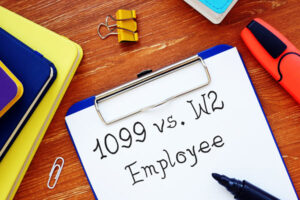Can Misclassification Affect Florida Workers’ Compensation?

When an employer hires a new employee, they must put them ‘on the books’ so the employee is able to file taxes and collect the benefits to which they are entitled. However, the misclassification of employees as independent contractors has been a serious problem for years now, and it shows no signs of stopping. If an employee is misclassified, it can affect not only benefits like healthcare and unemployment insurance, but it can also fundamentally affect your ability to collect workers’ compensation if you are injured on the job.
Lots Of Confusion Around Roles
Very often, if an employee is misclassified as an independent contractor, it happens without their notice, and they only discover the issue when they try to take advantage of a benefit available to employees, such as health insurance coverage. However, some employees are misled into thinking that their classification as an independent contractor is correct, even though it may not be – there are several pernicious myths that make the rounds about who exactly should be classified as an employee and who should not.
In most situations, it is better to be an employee. Independent contractors in Florida are not entitled to workers’ compensation coverage, and this is one of the major reasons why employers often try to misclassify workers to begin with. Generally, independent contractors are not entitled to most benefits employees can receive; this plus a lower payroll tax burden, plus lower workers’ compensation insurance premiums all add up to provide a significant incentive for employers to misclassify and hire more independent contractors.
Know Your True Classification
In order to receive workers’ compensation insurance after an on-the-job accident, you must be sure of your employee status. There are several different factors that a court will consider in terms of your true classification. Some include:
- The level of control (or lack thereof) that an employer can exert over the employee in terms of the nature of the work (such as the method used to do the work);
- The place where the work is done – someone working at home is not necessarily an independent contractor, but they are more likely to be;
- The level of specialized skill required;
- The method of payment; and
- Whether or not the parties believe they are creating an employer-employee relationship.
None of these are going to be definitive all on their own, but these factors, among others, can paint a fairly clear picture of what a worker’s status should be. If you are able to establish that you are an employee, you are entitled to seek workers’ compensation after an on-the-job accident, as long as your employer is covered under Florida law. If you can definitively establish that you have been misclassified, your employer may face both civil and criminal penalties, as intentional misclassification of workers is a felony in Florida.
Contact An Orlando Workers’ Compensation Attorney
Being injured at work can cause significant stress; finding out that you have been misclassified and are not entitled to workers’ compensation coverage would make that stress almost impossible to endure. The Orlando workers’ compensation attorneys at the Hornsby Law Group are ready and willing to try and help you with your case. Contact our offices today for a free consultation.
Source:
floridarevenue.com/taxes/taxesfees/Pages/rt_employee.aspx